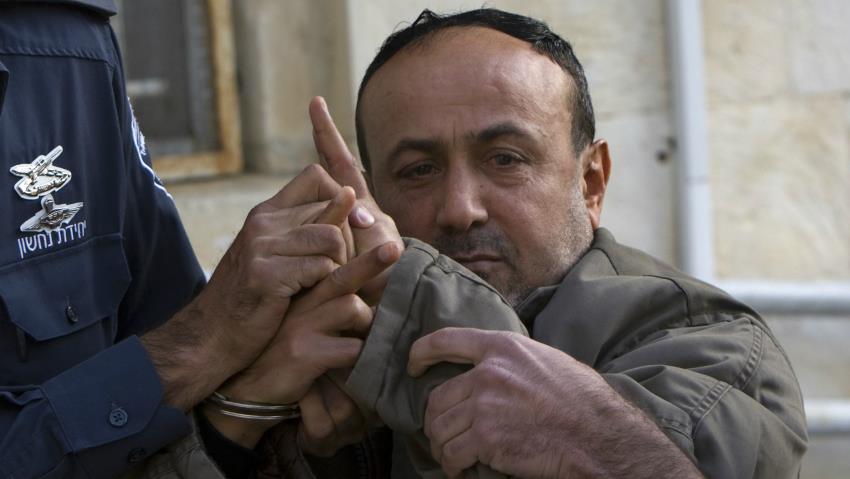This study examines the milestones in the life of Marwan Barghouti in an effort to reveal and analyzethe profound changes that occurred over the years within Fatah and in his positions regarding Israel. One of the issues examined was why Barghouti, who supported the Oslo Accords, was perceived as a peace activist and held talks with a broad spectrum of Israeli public figures, later became a terrorist operative (convicted of the premeditated murder of five people and of directing the second intifada). This study also tries to evaluate the degree of Marwan Barghouti’s popularity within Fatah and Palestinian society, and his chances of becoming Mahmoud Abbas’ successor. Another issue examined is whether Barghouti, even after having been convicted of terrorist activity during the second intifada, could be a partner in negotiations for peace between Israel and the Palestinians.
Main Points
1. Marwan Barghouti (Abu Qassam) was born in the village of Kobar (northwest of Ramallah) in 1959. He joined the ranks of Fatah in 1974, at the age of 15. When he was 19 he was detained by Israel for the first time and spent two years in prison for being an operative in a Fatah squad that had carried out a terrorist attack. He enrolled in BirZeit University in 1983. In 1986 he was detained and expelled to Jordan. He returned to Ramallah in 1994 after the Oslo Accords. He finished his BA with a degree in history and political science. He received an MA from BirZeit University in international relations in 1998.
2. After Marwan Barghouti returned to Judea and Samaria he supported the Oslo Accords, believing that eventually Israel would withdraw from the territories occupied in 1967 and that a Palestinian state would be established. During that period he was in contact with a broad spectrum of public figures in Israel’s left, center, and security establishment, who regarded him as an authentic Palestinian leader and a central partner for peace.
3. In 2000 he headed the Tanzim (Fatah’s ground operatives who spearheaded terrorist attacks against Israel during the second intifada). However, he lost the May 2000 Tanzim elections to Hussein al-Sheikh. He refused to cede the leadership because of a dispute over the election. Yasser Arafat, who wanted to encourage competition between the two, preferred not to tip the scales in favor of one or the other. Barghouti’s power struggles and his frustration with the conduct of Arafat and the veteran Fatah figures who had returned from Tunis also played an important role in radicalizing his positions on Israel.
4. Towards the end of the 1990s, and especially after the Camp David failure (July 2000), Barghouti jettisoned the expectations he had fostered after the Oslo Accords. He formed the concept that the only way the Palestinians could realize their rights was through armed struggle. Such a change in perspective made him extremely militant towards Israel when the second intifada broke out, and he became a key figure in fomenting and directing it until he was detained by Israel.
5. Marwan Barghouti was detained by the IDF on April 15, 2002, during Operation Defensive Shield. On June 6, 2004, the Tel Aviv district court convicted him of the premeditated murder of five people in three shooting attacks carried out in 2001- 2002. According to the verdict, he was directly involved in those attacks, and therefore sentenced to five consecutive terms of life imprisonment. He was also sentenced to 20 years in prison for his part in a suicide bombing attack that had been
prevented.









